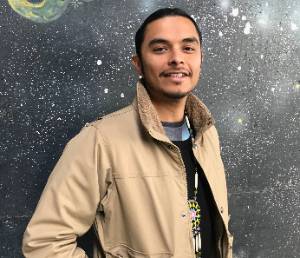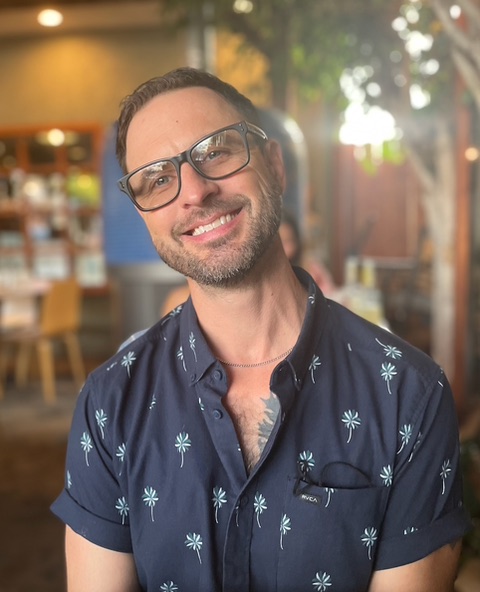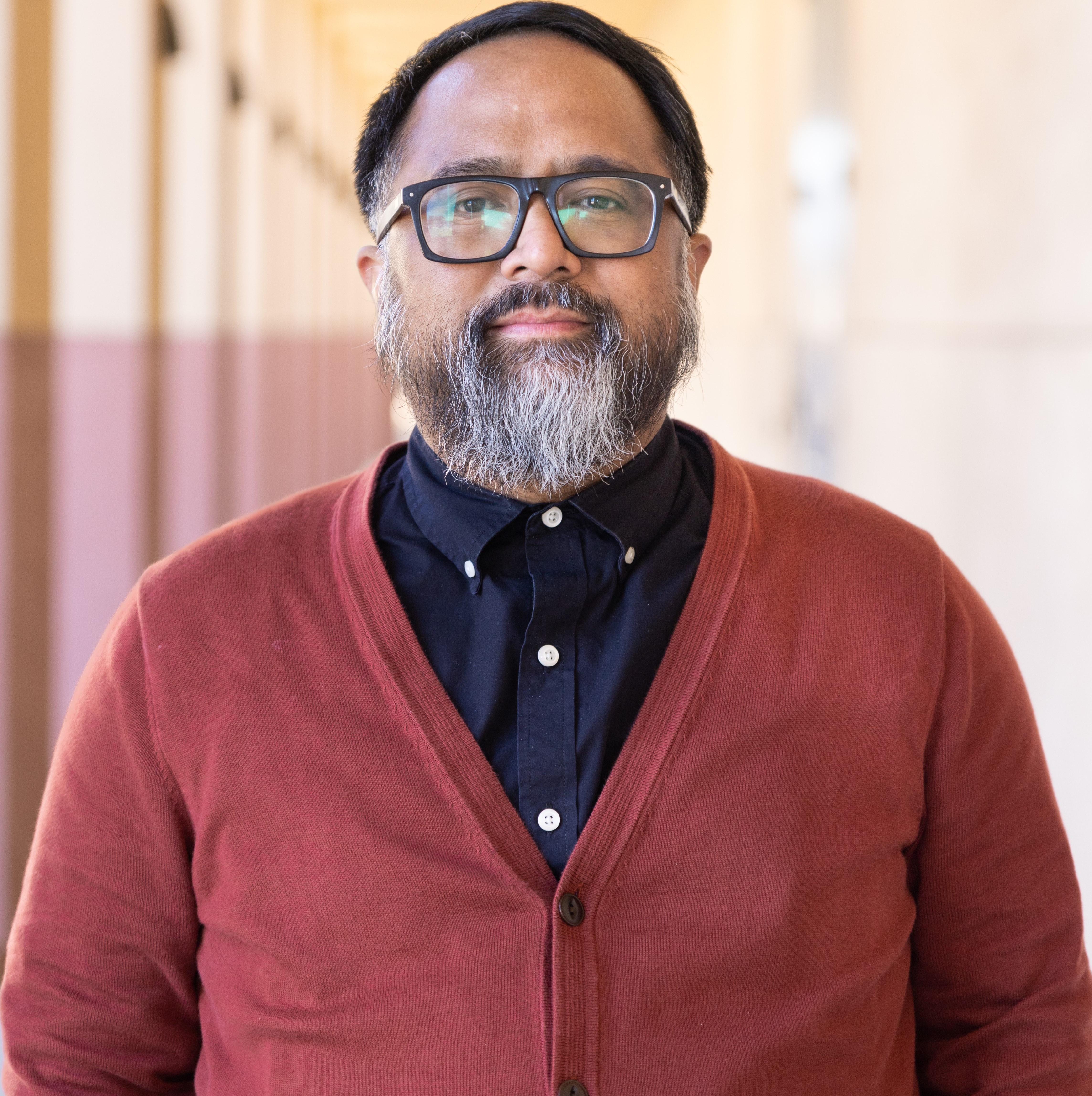 myCSUSM
myCSUSMFaculty & Staff
Domenique Maj
Administrative Support Coordinator, Ethnic Studies
dmaj@csusm.edu
(760)750-8054 | SBSB 2222

Marcelo Garzo Montalvo, Ph.D. (he/they)
Assistant Professor, Ethnic Studies
mgmontalvo@csusm.edu | SBSB 3204
- Marcelo Garzo Montalvo Biography
Dr. Marcelo Garzo Montalvo (he/they) is a musician, dancer, and Ethnic Studies scholar-activist. He is a first-generation Chilean-Canadian-American of Mapuche and Spanish descent. They hold a B.A., M.A. and PhD in Comparative Ethnic Studies from UC Berkeley, and were a community college transfer student from Mira Costa, Cabrillo and San Diego City Colleges. Their teaching and research focus on comparative and critical approaches to Black, Indigenous, Latinx and Xicanx Studies as well as Dance and Performance Studies. Before coming to CSUSM, Dr. Garzo Montalvo served as Visiting Assistant Professor of Latinx Studies in Harvard University’s Committee on Ethnicity, Migration and Rights, and as the Coordinator of Indigenous Technologies at the Berkeley Center for New Media. They have published articles on abolition, decoloniality and social movements for food, healing and ecological justice. His current book project, Armas Milagrosas/Miraculous Weapons, is a study of embodied knowledge, cultural decolonization and Xicanx indigeneities in the practice of Anahuacan ceremonial dance (Danza Azteca, Danza Mexica, Danza Chichimeca-Tolteca). They are also working on an experimental and collaborative research project called Conversations con Xochipilli, exploring questions of creativity, sexuality, science and consciousness through Queer and Two Spirit ceremonial knowledge.
- Scholarly and Creative works
- Garzo Montalvo, Marcelo. “Within and Without the Settler University: Reflections on Decolonization, Spirituality, and Research as Ceremony.” Agitate!: Unsettling Knowledges, Spring 2022.
- Bio-Ofrenda. "Elements Cycle." Bandcamp, 2019. https://bio-ofrenda.bandcamp.com/releases
- Garzo Montalvo, M. F. (2015). To the American food justice movements: A critique that is also an offering. Journal of Agriculture, Food Systems, and Community Development, 5(4), 125–129. http://dx.doi.org/10.5304/jafscd.2015.054.017
- BadAss Visionary Healers (Tieraney Carter, Rico Kleinstein Chenyek, M’kali-Hashiki, Marcelo Felipe Garzo Montalvo, Leah Lakshmi Piepzna-Samarasinha, Jonah Aline Daniel). “A Babe-ilicious Healing Justice Statement: from the BadAss Visionary Healers (BAVH).” nineteen sixty nine: an ethnic studies journal 2.1 (2013): 1-13. https://escholarship.org/uc/item/1z61z54j

Matthew J. Irwin, Ph.D.
Lecturer, Ethnic Studies
mirwin@csusm.edu | SBSB 3203
- Matthew J. Irwin Biography
Dr. Matthew Irwin (he/they) is a writer, editor, scholar, and parent. He’s a third-generation settler of Irish and German descent, born on Anishinaabe land along Great Black Swamp in the postindustrial zone of Toledo, Ohio. Dr. Irwin holds an MFA in Creative Writing from San Diego State University and a PhD in American Studies from the University of New Mexico. They received a BA in English from Miami University (Ohio). Their teaching and research focus on visuality and urban aesthetics through the lenses of critical ethnic studies and critical Indigenous studies. This work appears in numerous peer-reviewed articles, reviews, and commercial publications, including Capitalism Nature Socialism, InVisible Culture, Momus, and Hyperallergic. Their dissertation project, “(Sīˈtĭng) Detroit: Vision and Dispossession in a Midwest Bordertown,” examines news reports, films, maps, advertisements, murals, graffiti, landscapes, and architecture to demonstrate the ways in which the visual, rhetorical, and built environment of Detroit’s main thoroughfare, Woodward Avenue, upholds and renews the logics of white possession. Dr. Irwin also contributed to a chapter on multimodal writing and rhetoric in the book Bridging the Multimodal Gap: From Theory to Practice, edited by Santosh Khadka and J.C. Lee for the University Press of Colorado. He previously taught American Studies, Native Studies, Cultural Studies, and Writing at San Diego State University, the University of Wyoming, Minneapolis College of Art and Design, Central New Mexico Community College, and the University of New Mexico.
- Scholarly and Creative Works
2020 “Severing Union: The Queer Performance of Steven Paul Judd’s ‘Stop the DAPL’” Hemisphere: Visual Culture of the Americas, University of New Mexico, 7,424 words
2020 “Lifesaving and Abolitionism: Shifting the Frame on Prison Art” Momus, online, 1,826 words
2020 “Fronteristxs Against Private Prisons” Santa Fe Reporter, online, 839 words
2019 “The Legacy of Mary Sully: Early Indigenous Feminism and the ‘American Indian Abstract,’” Momus, online, 1,909 words
2018 “The New Jail: Profit and Social Control" Riverwise Magazine, James and Grace Lee Boggs Center, 6
2018 “Puerto Rico: Defying Darkness,” caareviews.org, College Art Association of America, online, 1,594 words
2017 “‘Your Wilderness’: The White Possession of Detroit in Jim Jarmusch’s Only Lovers Left Alive,” Capitalism, Nature, Socialism, Taylor & Francis, 78-95
2017 “Suturing the Borderlands: Postcommodity and Indigenous Presence on the U.S.-Mexico Border,” InVisible Culture: An Electronic Journal for Visual Culture, University of Rochester, online, 9,787 words

Jason Magabo Perez, Ph.D.
Associate Professor, Ethnic Studies Program Director
(760) 750-8258 | jmperez@csusm.edu | SBSB 3201
- Jason Magabo Perez BiographyDr. Jason Magabo Perez blends poetry, prose, performance, film/video, ethnography, and oral history to investigate Filipina/o/x American histories, state violence, colonization, migration, memory, and intimacy. Perez is the author of two hybrid collections of prose and poetry: Phenomenology of Superhero (Red Bird Chapbooks, 2016); and This is for the mostless (WordTech Editions, 2017). Perez’s writing has also appeared in Witness, TAYO, Entropy, and Feminist Wire. Perez has written, developed, and performed three live multimedia performance works: The Passion of El Hulk Hogancito (2009); You Will Gonna Go Crazy (2011), which was commissioned by Kularts, Inc. and funded by a Challenge America Grant from the National Endowment for the Arts; and Blue Bin Improvisations (2018), which was commissioned and presented by MexiCali Biennial and Los Angeles Contemporary Exhibitions. Formerly a featured artist at the New Americans Museum and community scholar-in-residence at San Diego Public Library, Perez has, for over 15 years, performed, lectured, and convened dialogues, panels, and workshops in public libraries, community centers, and K-12, college, and university classrooms. Perez has performed at notable venues such as the National Asian American Theatre Festival, International Conference of the Philippines, Yerba Buena Center for the Arts, and La Jolla Playhouse. Alumnus of the VONA Writing Workshops, Perez holds an M.F.A. in Writing and Consciousness from New College of California and a dual Ph.D. in Ethnic Studies and Communication from UC San Diego. Dr. Perez previously served as Assistant Professor of English at CSU San Bernardino (2016-2019) and currently serves as Assistant Professor of Ethnic Studies at CSU San Marcos.
Phonshia Nie, Ph.D.
Lecturer, Ethnic Studies
pnie@csusm.edu | SBSB 3203
- Phonshia Nie BiographyComing soon

Christiane Assefa
Assistant Professor, Ethnic Studies
cassefa@csusm.edu | SBSB 3202
- Christiane Assefa BiographyChristiane Assefa is a community-engaged scholar, educator, and researcher. Bringing together the fields of Black Diaspora Studies and Critical Refugee Studies, her work explores how the lifemaking practices of East African refugee communities are critical sites of knowledge production and social change. Broadly, Christiane is interested in reproductive justice, histories of Black-led social movements, and border imperialism. Embracing an interdisciplinary approach, she studies landscapes of Black refugee social life through ethnography, archival research, Black visual culture, and oral history—highlighting critical narratives about the history and subjectivity of forcibly displaced communities from East Africa.
Tanya Lancaster
Lecturer, Ethnic Studies
tlancaster@csusm.edu | SBSB 2130
Taelani Camacho
Lecturer, Ethnic Studies
tcamacho@csusm.edu | SBSB 3203






